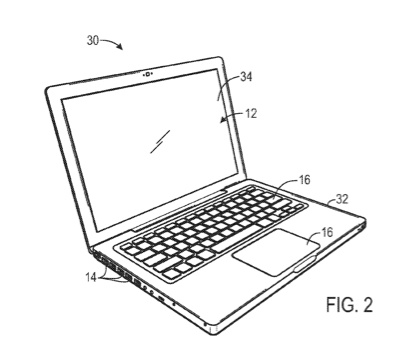An Apple patent (number 20120050307) for an ambient light sensing technique has appeared at the U.S. Patent & Trademark Office and shows that Apple is working on ways to control characteristics of electronic devices — such as laptops and iPhones– based on ambient light levels.
In one embodiment, the method includes receiving light at an ambient light sensor of a device and measuring components, such as color components, of the visible light. The component levels may be weighted differently by factors that vary based on the intensity of the light received by the ambient light sensor.
Also, the brightness level of a light source in the device or color output of the device may be controlled based on the weighted component levels. Additional methods, systems, and devices relating to control of an electronic device based on sensed ambient light are also disclosed. Peter H. Mahowald and Ulrich T. Barnhoefer are the inventors.
Here’s Apple’s background and summary of the invention: “This section is intended to introduce the reader to various aspects of art that may be related to various aspects of the present disclosure, which are described and/or claimed below. This discussion is believed to be helpful in providing the reader with background information to facilitate a better understanding of the various aspects of the present disclosure. Accordingly, it should be understood that these statements are to be read in this light, and not as admissions of prior art.
“Many electronic devices include display screens to provide visual output. As may be appreciated, such display screens are used in a wide variety of devices, including desktop computer systems, notebook computers, handheld computing devices, televisions, cellular phones, and portable media players, to name only a few examples. Many of these electronic devices also include backlights that illuminate the display screens.
“Ambient light sensors may be included in electronic devices to enable ambient light levels to be sensed, and to control the brightness of a display backlight based on the ambient light levels. In some instances, such control may facilitate power conservation and an improved user experience (e.g., by making the display easier to read at different ambient light levels).
“A summary of certain embodiments disclosed herein is set forth below. It should be understood that these aspects are presented merely to provide the reader with a brief summary of these certain embodiments and that these aspects are not intended to limit the scope of this disclosure. Indeed, this disclosure may encompass a variety of aspects that may not be set forth below.
“The present disclosure generally relates to ambient light sensors and to altering visual output characteristics of electronic devices based on sensed ambient light conditions. In one embodiment, an electronic device measures ambient illumination levels and adjusts the spectral response of an ambient light sensor based on the measured ambient illumination levels. In some instances, the spectral response of the ambient light sensor may be adjusted to more closely simulate the spectral response of a human eye, which has a response that varies depending on ambient illumination levels.
“The output from the ambient light sensor may be used for controlling various aspects of the device, such as a display backlight brightness level, a keyboard backlight brightness level, or the colors output via a display. Additionally, one embodiment may include a device having multiple light sensors for detecting light at different frequencies and for controlling aspects of the device based on the color content of the ambient light.
“Various refinements of the features noted above may exist in relation to the presently disclosed embodiments. Additional features may also be incorporated in these various embodiments as well. These refinements and additional features may exist individually or in any combination. For instance, various features discussed below in relation to one or more of the illustrated embodiments may be incorporated into any of the above-described embodiments alone or in any combination. Again, the brief summary presented above is intended only to familiarize the reader with certain aspects and contexts of embodiments of the present disclosure without limitation to the claimed subject matter.”


